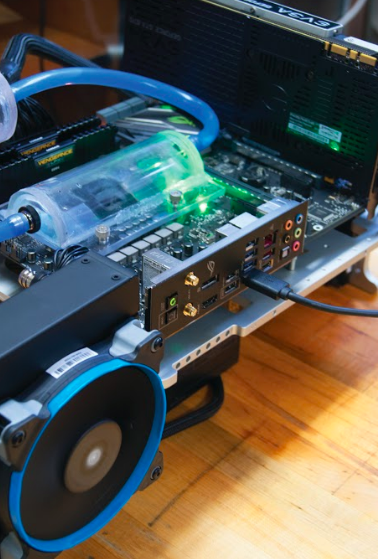Beaver Overdrive creates learning, internship opportunities
May 29, 2018
Students compete in overclocking, improving computer systems.
Dedicated to helping students gain experience in thermal management principles early on in their undergraduate careers, Beaver Overdrive, a club in its first year, focuses on overclocking computers.
According to Matthew Harrison, the cofounder and adviser of Beaver Overdrive, overclocking is a process in which one purposefully pushes their computer to its limit.
“Your processor is allowed to run x amount of calculations per second and when we overclock it, we take it and make it go 2x, 3x or 4x faster,” Harrison said. “One way I like to explain it is if you’ve seen ‘Fast and Furious,’ you have a fast car and when you put NOS in it, you go faster. So basically our goal is to put NOS in the system.”
Overclocking refers to pushing a computer’s components harder and faster than the manufacturer designed them to go, according to PCworld.com.
This process is often used for gaming purposes, said Genevieve Gaudin, a fourth-year in mechanical engineering and active member of Beaver Overdrive.
“If you’re gaming and you want to have really high resolution or frames per second, you can go into a software that changes the parameters that go to the CPU to increase the frequency and the voltage,” Gaudin said.
Over the past couple of months, Beaver Overdrive has competed monthly on HWBot, a website where people can post benchmarks and scores to compare their overclocking skills against others across the world. HWBot is the world’s recognized leader for holding overclocking competitions.
Within the time that Beaver Overdrive has been a club, it has placed fourth twice and 10th against other competitors around the world in Rookie Rumble, a competition held by HWbot.
The competition includes a number of tests measuring how fast and efficiently the team’s system can perform calculations such as pi to one billion digits.
Beaver Overdrive is the first collegiate competitive computer overclocking team, Joshua Gess, the assistant professor of Mechanical, Industrial and Manufacturing Engineering and faculty mentor for Beaver Overdrive. The club is competing against other experienced overclockers, and is bringing a fresh perspective to the field.
Gess said the Beaver Overdrive team works well together, which leads to having a strong team.
“We want to show folks how strong we are as a team, not just in the overclocking community, but from a thermal management design perspective,” Gess said.
Alongside competing, Beaver Overdrive has began providing students with opportunities that will help further their careers outside of college, Gess said.
“We have formed very strong partnerships with Intel and Facebook,” Gess said. “Two of our students have already gotten internships at Intel and we aren’t even a year old.”
Gaudin is one of the students who received a year-long internship that assisted her in securing her spot in graduate school. Members of the club visited Intel where they were able overclock a system they were given. Facebook also provided Beaver Overdrive with VR headsets to help with outreach.
“Intel especially sees what we are doing here, introducing students to extreme thermal management problems at a stage years before they would see any of these concepts in the classroom,” Gess said. “They are learning about things that make them impactful on day one.”
Harrison said Beaver Overdrive and its students have great hopes for the future and plan to take the club to the top.
“We expect to see Beaver Overdrive becoming a staple at Oregon State University and being one of the major clubs that everyone knows about,” Harrison said.
Gess hopes that one day Beaver Overdrive becomes as big or even bigger than the OSU car and rocket clubs, both of whom the club looks up to.
“What I hope is for it to put us on the map as far as electrical packaging goes and to prepare us for when the big schools like Georgia Tech reach us, that we will be one step ahead,” Gess said.
Beaver Overdrive’s next endeavor is an additively-manufactured heat sync design challenge run by General Electric. Ten chosen design teams from across the nation will have their designs tested and printed at OSU for a chance to compete at Interpac, a conference in San Francisco, Calif.
“I’m very confident that our team will be one of the four finalists,” Gess said. “We are going to work hard.”
Beaver Overdrive has had great success with recruiting and is hoping for more students to join, Harrison said.
“When we were recruiting, Dr. Gess and I said we only needed three good students for this club to lift, and lucky we’ve gotten 12 great, active students,” Harrison said.
The students meet every Wednesday at 6 p.m. in 332 Rogers Hall. The club is eager to have any student join and is not looking for just engineers.
“Our president is a history and education major, and we have an interior designer who is designing our lab,” Harrison said. “I think it doesn’t have to be just engineering students, and it shouldn’t be just be engineers.”
Questions about the club may be directed to to Andrew Murga, the president of Beaver Overdrive, at [email protected].










































































































